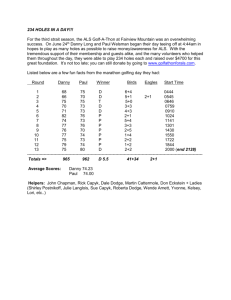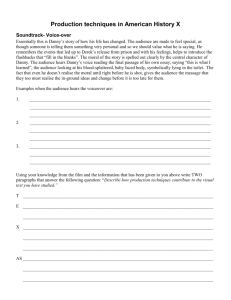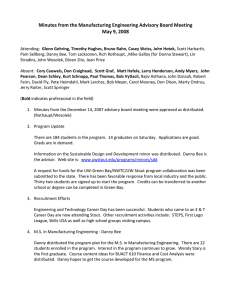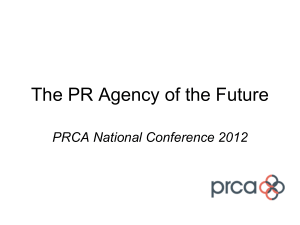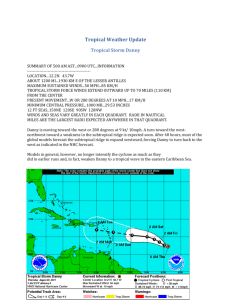AGEC 430/ECON 430 ENVIRONMENTAL ECONOMICS Instructor:
advertisement
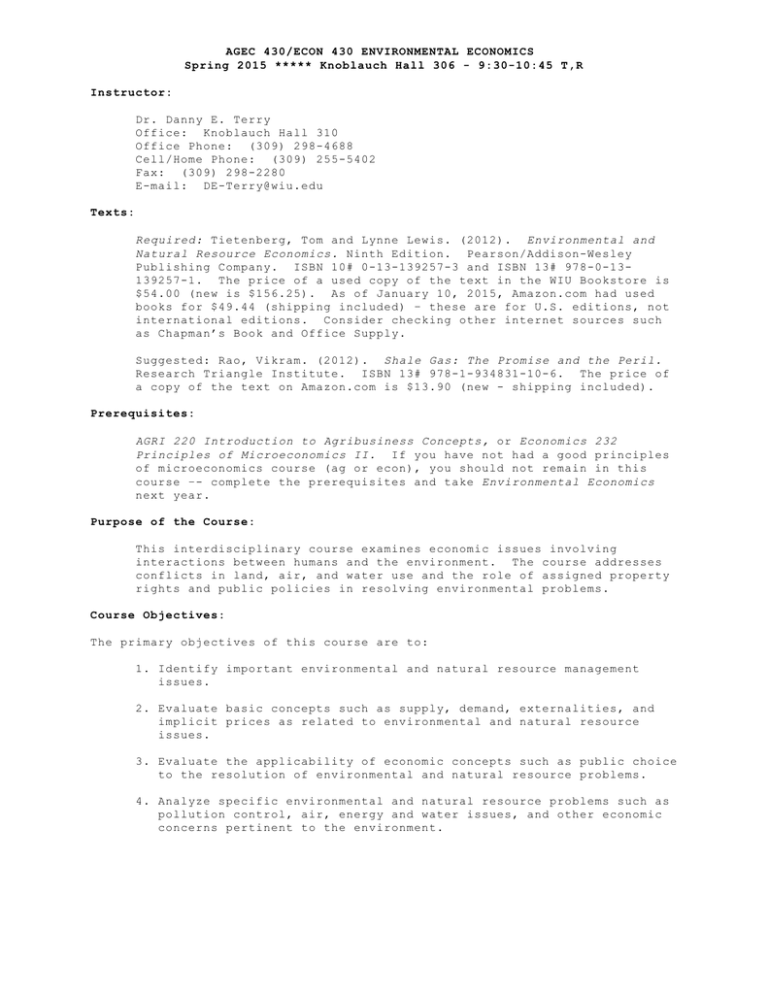
AGEC 430/ECON 430 ENVIRONMENTAL ECONOMICS Spring 2015 ***** Knoblauch Hall 306 - 9:30-10:45 T,R Instructor: Dr. Danny E. Terry Office: Knoblauch Hall 310 Office Phone: (309) 298-4688 Cell/Home Phone: (309) 255-5402 Fax: (309) 298-2280 E-mail: DE-Terry@wiu.edu Texts: Required: Tietenberg, Tom and Lynne Lewis. (2012). Environmental and Natural Resource Economics. Ninth Edition. Pearson/Addison-Wesley Publishing Company. ISBN 10# 0-13-139257-3 and ISBN 13# 978-0-13139257-1. The price of a used copy of the text in the WIU Bookstore is $54.00 (new is $156.25). As of January 10, 2015, Amazon.com had used books for $49.44 (shipping included) – these are for U.S. editions, not international editions. Consider checking other internet sources such as Chapman’s Book and Office Supply. Suggested: Rao, Vikram. (2012). Shale Gas: The Promise and the Peril. Research Triangle Institute. ISBN 13# 978-1-934831-10-6. The price of a copy of the text on Amazon.com is $13.90 (new - shipping included). Prerequisites: AGRI 220 Introduction to Agribusiness Concepts, or Economics 232 Principles of Microeconomics II. If you have not had a good principles of microeconomics course (ag or econ), you should not remain in this course –- complete the prerequisites and take Environmental Economics next year. Purpose of the Course: This interdisciplinary course examines economic issues involving interactions between humans and the environment. The course addresses conflicts in land, air, and water use and the role of assigned property rights and public policies in resolving environmental problems. Course Objectives: The primary objectives of this course are to: 1. Identify important environmental and natural resource management issues. 2. Evaluate basic concepts such as supply, demand, externalities, and implicit prices as related to environmental and natural resource issues. 3. Evaluate the applicability of economic concepts such as public choice to the resolution of environmental and natural resource problems. 4. Analyze specific environmental and natural resource problems such as pollution control, air, energy and water issues, and other economic concerns pertinent to the environment. Basis for Student Evaluation: The course grade will be based on the following factors, with weighted values as indicated: Exam 1 ------------------------------------------- 20% Exam 2 ------------------------------------------- 20% Debate ------------------------------------------- 20% Issue Paper -------------------------------------- 20% Final Exam --------------------------------------- 20% Total----------100% Your grade will be based on the number of points you earn for exams, debates, and issue paper. The final grading scale is based on the percentages shown below: A = 100-93 A- = 92-90 B+ = 89-87 B = 86-83 B- = 82-80 C+ = 79-77 C = 76-73 C- = 72-70 D+ = 69-67 D = 66-63 D- = 62-60 F = 59-0 There will be no "extra credit" assignments; however grades may be curved upward at the end of the semester. Exam 1 and Exam 2: The exams (primarily essay) will be over lectures, presentations, handouts, videos, debates, guest speakers, and class discussions. The writing component will be evaluated along with content. Exams will not be given early - so please don’t ask. Debate: Each class member will participate in a modified debate. Teams will consist of several (the actual number depends on the class size) "randomly" selected members and topics will be assigned approximately one month in advance. It should be noted that you will probably be arguing positions contrary to your personal beliefs and values. Appearance and speaking ability will not enter into the evaluation. Evaluations will be based on a three-step process dealing primarily with the quantity, quality, and credibility of facts presented; teams' abilities to "get their points across;" and the overall debate. First, the team with the most votes (each winning team is decided by fellow classmates) gets a higher grade than the losing team (for that debate). Second, and perhaps more important, Danny will evaluate the debates based on facts presented and the credibility of the sources, and his expectations of the credible facts and sources (and to a certain extent he will compare them to the other debates using the same criteria) -this is a rather subjective part of the process, but Danny will try to be fair to all teams. So, it is possible for one team to win one debate, yet get a score lower than a team losing another debate. Third, Danny will consider the teams and their peer evaluations to determine if someone has not participated equally (if this is the case, then that student would not receive full credit -- his/her score depends on how poorly he/she participated in the team activities); otherwise all members of the team will receive the same score. It is a complicated and somewhat subjective process, and doesn't directly relate to how an individual could have done a better job. The fully-participating members of the winning teams of the debates will receive 3% added to their final grade average. Issue Paper: As a member of the class, you will write a 6-10 page (typed, double-spaced) policy paper discussing a "highly controversial issue" in environmental economics (the topic of “hydraulic fracturing” is reserved for class discussion and will not be available for use as an issue paper topic). The issue you select must be approved by Danny before you begin the process. Details on issue paper topics will be distributed at a later date. Your paper must be well organized following good essay format and use of the English language. The writing component (format, grammar, spelling, etc.) will account for approximately 20% of the grade. Use a 12-point font-size, Courier New font, and one-inch margins on all sides. The 6-10 page requirement relates only to the text -- title page and other attachments are not included in the 6-10 page requirement. Be sure to include in-text source identifications and a bibliography page (see A Pocket Style Manual by Diana Hacker). The paper is due by Thursday, May 7, 2015 at 9:30 AM. Late papers will not be accepted. Final Exam: The final essay exam will be comprehensive, but will also emphasize hydraulic fracturing. The writing component will be evaluated along with content. The final exam will not be given early –- so please don’t ask. Score Revisions: Occasionally a scoring mistake will be made -professors are human, too. If you feel that you deserve more credit than you received, see Danny after class in his office. Come with a "perfect" answer in mind and he'll compare that to what you have written. If the score is too low, it will be raised immediately. Also Danny would be deeply impressed with the integrity of students who come to him to report that he made an addition error and/or gave too much credit. Expectations of Students: Attendance and Participation: This is primarily a lecture and discussion course. Questions will be raised in class for response and discussion. You are encouraged to express economic opinions. Bring questions to class. You share the responsibility for getting the various viewpoints aired. Regular attendance and timely arrival is expected. Plan not only to show up, but to write, to think, and to speak. Be prepared to challenge the basic premises of the class and the readings. A variety of perspectives and opinions will be strongly encouraged, along with vigorous (but civil) debate and argument. Be willing to take some chances intellectually. At times the class will emphasize discussion and rely little on lectures by Danny. Regular attendance (and timely arrival) is expected (just like showing up for work - and showing up on time - is required if you want to keep your job). Conducting yourself in a professional manner: A few things to avoid in any college classes are: 1) carrying on personal conversations with others during lectures; 2) sending text messages on your cell phones during class; 3) allowing your cell phone to ring during class; 4) missing class and asking “Did I miss anything important?”; 5) placing your head on your desk or falling asleep during the lecture/class; 6) being excessively tardy; 7) failing to read assigned textbook or collateral material; 8) being absent on exam days; and 9) not bringing required materials to class. Thus, specifically for AGEC/ECON 430(and many other courses), regular attendance (and timely arrival) is expected (just like showing up for work - and showing up on time is required if you want to keep your job). Notify Danny if you are going to be absent. Each person in the classroom is expected to treat everyone else as members of a scholarly community – provide useful critique and refrain from destructive or harassing commentary. Be professional. Turn off and put away your laptop computer, iPhone, iPad, Blackberry, Android, etc. when you arrive. DO NOT send text messages, check email, or browse the web during class – put your phones away and leave them there! If you need an exception to the computer and phone policy due to medical or safety reasons, you should discuss this with Danny BEFORE class begins that day. Keep your arguments civil – classroom disruption will be seen as a disciplinary offense. These types of behaviors (as listed above) during class will lead to possible dismissal for the day. Two dismissals due to disruptive or unprofessional behavior will result in a permanent disbarment from the course and a final grade of “F” will be assigned – the student may appeal this decision to the Council on Admission, Graduation and Academic Standards. Academic Integrity: It is felt that you are well aware of what actions violate the standards of academic honesty which have been established at this University. If you are not aware of what constitutes an academic violation, or not aware of regulations/policies, please refer to www.wiu.edu/policies/acintegrity.php on WIU’s webpage. It would be unfair to violators and to other students for Danny not to follow through with the disciplinary process which has been established when he is certain a violation has occurred. If caught cheating on an exam or plagiarizing others' work, Danny will follow-up with a written report to you explaining the situation as he views it, and the evidence he has pertaining to the event. After meeting with you, if Danny is still convinced that you were cheating (this includes plagiarism), you will be assigned a final grade of "F" for this course. A full disclosure of student rights and responsibilities can be found at www.wiu.edu/policies/acintegrity.php on WIU’s webpage. Seating Chart: To help Danny to get to know you personally, you are asked to establish a regular seat by the third class period. Danny will put your names on a seating chart so that he might better and more quickly put names with faces. Teaching Philosophy of Danny Terry: The test of a good teacher is not how many questions he can ask his students that they will answer readily, but how many questions he inspires them to ask him which he finds it hard to answer. Alice Wellington Rollins Danny Terry believes that a university system is comprised of a leadership team made up of a president, provost, vice presidents, college deans, chairpersons, faculty, and staff who are responsible for the coordinated effort of teaching/learning directed to the most important members of the university system -- the students. Danny's individual teaching style can best be described as open, informal, and one of active participation. As a teacher, his primary objective is to assist (not spoon feed) students in learning and ensure their abilities so they can achieve their goals. He views himself as a facilitator of learning. Danny tries not to emphasize memorization beyond what is necessary, but does try to provide leadership and encourage scholarship, knowledge, problem-solving, and application. Oftentimes the cause and effect flow in teaching/learning is reversed; often Danny learns from his students. He encourages them to ask "the difficult questions" of him and those around them. It is his policy to explain to the students that he makes mistakes -- Danny is as imperfect as the next person. Danny regularly asks for guidance and suggestions to improve his teaching skills, but more importantly to improve students' ability to understand, learn, communicate, and apply. He strives for a relaxed classroom atmosphere where students can at any time ask questions or provide additional relevant comments. Danny feels that teachers must take personal and moral responsibilities for improving the intellectual environment, developing a global perspective in all facets, encourage strong leadership and support by challenging that leadership through appropriate means, and focus on presenting academic programs in a manner that is more interdisciplinary, intergenerational, intercultural, and international. Danny also feels that students must be prepared and willing to actively participate in such an environment. Office Hours: You are encouraged to visit Danny in his office. An appointment is not necessary if you plan to visit during Danny's office hours, but a call may save you some time. To make your visit more productive, plan to bring a list of specific questions or troublesome topics. If you have a specific question, you may call Danny at his office. You may also call him at his home in the evening, but only before 9:00 p.m. If it is an absolute emergency, the time restriction is waived (remember -- your definition of an absolute emergency and Danny's definition might be different). Agricultural Education Majors: If you are majoring in Agricultural Education (or other education major), you are required to receive a grade of "C" or better in this course in order to meet State of Illinois certification requirements. With the current university +/- grading system, receiving a "C-" or below will require you to retake this course or find a substitute course to meet School of Agriculture graduation requirements. Americans with Disabilities Act (ADA): At Western, accommodations in the area of test and note-taking may be made for any student who notifies the instructor of the need for an accommodation. Any student with a documented disability, that needs classroom accommodations, e.g., academic or emergency evacuation, is requested to set up a meeting with Danny to discuss accommodations. It is imperative that you take the initiative to bring such needs to the attention of your instructors, as they are legally not permitted to inquire about such particular needs of students. For AGEC/ECON 430 Environmental Economics, if you feel you need special accommodations, please feel free to come and discuss this with Danny or contact Tara Buchannan (298-2512) at Disability Resource Center -- Memorial Hall 143. Food, Beverage, and Tobacco Policy: The use of tobacco is prohibited in Knoblauch Hall. Course Outline: Below is the tentative schedule for AGEC 430/ECON 430 Environmental Economics. Depending on the number of students in the course, the schedule may change significantly (if this occurs, Danny will distribute a new schedule). As with any plan, one must be flexible. January 20 January 22 January 27 January 29 February 3 February February February February 5 10 12 17 February 19 February 24 February 26 March 3 March 5 March 10 March 12 March 17 March 19 March 24 March 26 March 31 April 2 April 7 April 9 April 14 April 16 April April April April May 5 May 7 May 14 21 23 28 30 (T) - Introduction to the course; Preface; Chapter 1: Visions of the Future (R) – Chapter 1: Visions of the Future; Chapter 2: The Economic Approach - Property Rights, Externalities, and Environmental Problems (T) - Chapter 2: The Economic Approach - Property Rights, Externalities, and Environmental Problems (R) - Chapter 3: Evaluating Trade-Offs - Benefit-Cost Analysis and Other Decision-Making Metrics (T) - Chapter 3: Evaluating Trade-Offs - Benefit-Cost Analysis and Other Decision-Making Metrics (R) - Chapter 4: Valuing the Environment: Methods (T) - Chapter 4: Valuing the Environment: Methods (R) - Lincoln’s Birthday (no class) (T) - Chapter 5: Dynamic Efficiency and Sustainable Development; Issue Title Due (R) - Chapter 6: Depletable Resource Allocation - The Role of Longer Time Horizons, Substitutes, and Extraction Cost (T) - Chapter 6: Depletable Resource Allocation - The Role of Longer Time Horizons, Substitutes, and Extraction Cost (R) - Exam #1 (Chapters 1-6) (T) - Chapter 7: Energy - The Transition from Depletable to Renewable Resources (R) - “How to Debate”; Debate Example (T) - Debate Topic Selections; Chapter 8: Recyclable Resources - Minerals, Paper, Bottles, and E-Waste (R) - Chapter 9: Replenishable but Depletable Resources Water (T) - Spring Break (No Classes) (R) - Spring Break (No Classes) (T) - Chapter 10: A Locationally Fixed, Multipurpose Resource - Land (R) - Chapter 11: Reproducible Private-Property Resources: Agriculture and Food Security (T) - Chapter 16: Climate Change (R) - Chapter 17: Mobile-Source Air Pollution (T) - “The Population Paradox”; Voluntary Draft of Issue Paper Due (R) - Chapter 21: Population and Development (T) - Exam #2 (Chapters 7-11, 16-17, 21) (R) - Debate Preparation (no class meeting - work with group members in library) (T) - Debate #1 (R) - Debate #2 (T) - Opening Discussions on Fracking and “Gasland” (R) - Continued Discussions on Fracking (T) - Continued Discussions on Fracking (R) - Continued Discussions on Fracking; Course Wrap-up; Issue Paper Due (R) - Final Exam at 8:00 AM (Hydraulic Fracturing and Chapters 1-11,16,17, 21) Important Dates: January 26 - Open registration ends February 2 - Last day to process a drop without being assessed tuition or receiving a “W” grade; a full refund will be made of all tuition and mandatory fees for any student totally withdrawing from the University February 12 - Lincoln’s Birthday –- classes dismissed March 16-20 - Spring break –- classes dismissed April 1-17 - Advance registration for Summer 2015 and Fall 2015 April 5 - Last day to make a total university withdraw April 5 - Last day to drop a 16-week class May 11-15 - Final exam week (AGEC/ECON 430 -- Thursday, May 14 @ 8:00 AM) May 20 - Grades available on STARS OFFICE HOURS AND CLASS SCHEDULE SPRING ‘15 Name: Danny E. Terry M onday 7:00 -- 7:30 7:30 -- 8:00 8:00 -- 8:30 8:30 -- 9:00 9:00 -- 9:30 9:30 - 10:00 10:00 - 10:30 10:30 - 11:00 11:00 - 11:30 11:30 - 12:00 12:00 - 12:30 12:30 -- 1:00 1:00 -- 1:30 1:30 -- 2:00 2:00 -- 2:30 2:30 -- 3:00 3:00 -- 3:30 3:30 -- 4:00 4:00 -- 4:30 4:30 -- 5:00 5:00 -- 5:30 5:30 -- 6:00 Evening Prepare for Class Prepare for Class 333 Ag Marketing 333 Ag Marketing Office Hours Office Hours Prepare for Class Prepare for Class 390 Ag Sales 390 Ag Sales Office Phone: 309.298.4688 Tuesday Prepare for Class Prepare for Class 430 Enviro Econ 430 Enviro Econ 430 Enviro Econ Office Hours Office Hours Wednesday Prepare for Class Prepare for Class 333 Ag Marketing 333 Ag Marketing Office Hours Office Hours Prepare for Class Prepare for Class 390 Ag Sales 390 Ag Sales MDH MDH MDH MDH MDH MDH MDH MDH Volunteer Volunteer Volunteer Volunteer Volunteer Volunteer Volunteer Volunteer Cell Phone: 309.255.5402 Thursday Prepare for Class Prepare for Class 430 Enviro Econ 430 Enviro Econ 430 Enviro Econ Office Hours Office Hours Friday Prepare for Class Prepare for Class 333 Ag Marketing 333 Ag Marketing Office Hours Office Hours Prepare for Class Prepare for Class 390 Ag Sales 390 Ag Sales
